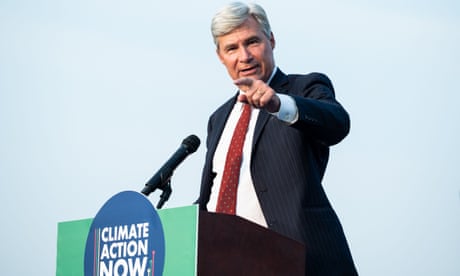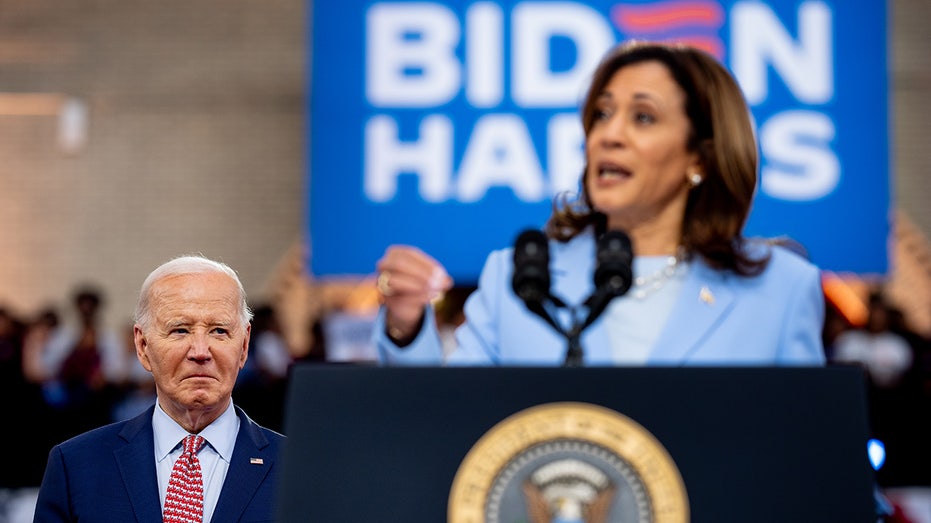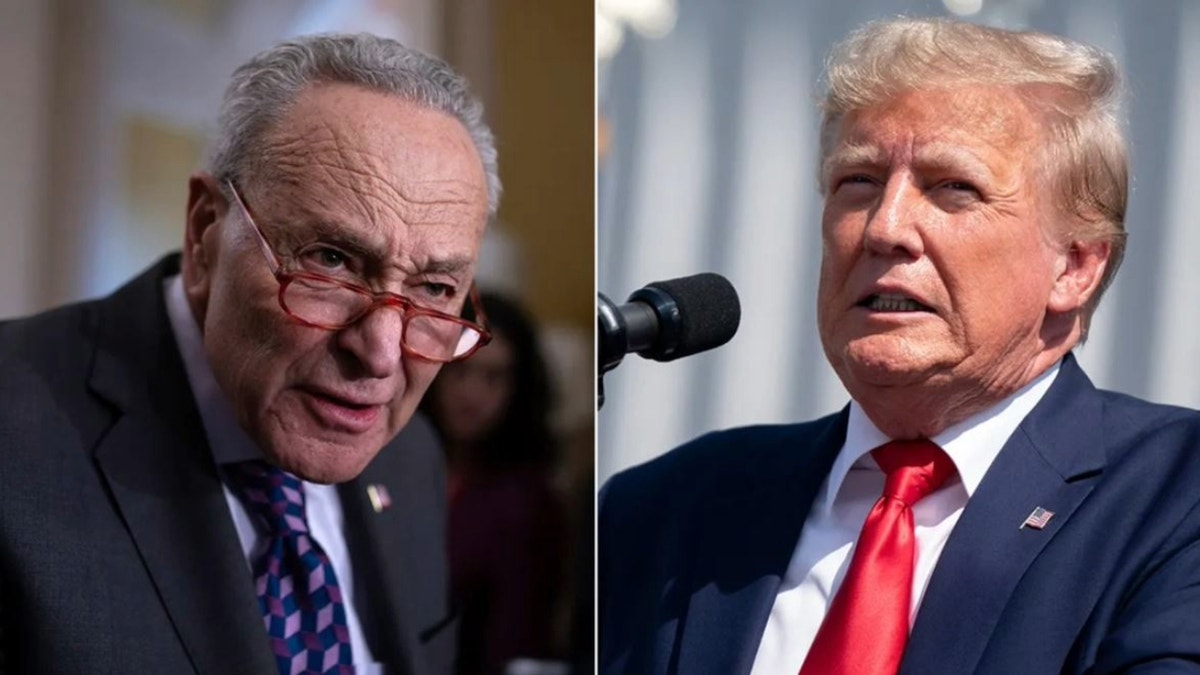- by foxnews
- 14 Mar 2025
Climate action has been ‘a calamity’, says Senate Democrat Sheldon Whitehouse
Climate action has been ‘a calamity’, says Senate Democrat Sheldon Whitehouse
- by theguardian
- 26 Mar 2022
- in news

For nine years, Senator Sheldon Whitehouse, a Democrat representing Rhode Island since 2007, made weekly speeches called "Time To Wake Up" urging the Senate to take action on the climate emergency.
He ended the weekly ritual once Joe Biden became president and Democrats took control of both houses of Congress. But now, with hopes of new climate legislation in shambles, Whitehouse is back at it again. "I revived the speech series because I lost confidence in the momentum for a climate solution," he said.
Whitehouse spoke to the Guardian about Biden's stalled climate agenda, dark money influencing politics, and a future beyond fossil fuels.
Why has there been no visible progress when there is a Democrat in the White House and Democrats control Congress?
"The Democratic party has never taken climate change as seriously as it should. It has never put the energy into it that would create a public reaction of support that would then encourage more activity.
More specifically, we put all of our eggs in the basket of the big reconciliation bill [Build Back Better legislation], and the belief that everything was going to be made right by that. To the extent we needed to keep the caucus together for that piece of legislation, we weren't going to do anything serious on regulation or on litigation lest it disturb the process. That was not the best way to go. We need to reboot. We need to do what we can through legislation but we also need to really push the throttle forward on regulation and on litigation."
You've spoken in the past about the impact of corporate dark money, the oil industry's climate denialism and fossil fuel company strategies to delay environmental regulation and policies. But it sounds as if the issue is a lack of political will as much as resistance by financial and industrial interests to push forward the climate agenda.
"The two are related. We probably would have succeeded at the legislation were it not for the organised opposition by fossil fuel interests to prevent those things from happening. You need to be prepared to step up your counter-pressure on the fossil fuel industry in order to succeed. I think it's in that area that we've been particularly derelict.
But as powerful as the oil and gas industry disinformation machinery is, it does have an achilles heel. The more it's exposed, the more it's brought to light, the more the public understands what the industry has been up to, the more the pressure of public opinion and of the vote can be brought to bear."
To that end, you have sponsored legislation to expose the flow of what you have described as dark money from the fossil fuel industry and others that, in your words, has infiltrated deep into politics, captured the supreme court, and threatens American democracy. The Disclose Act would require organisations spending money in federal elections to reveal the sources of their funding. What are the prospects for that legislation?
"The president asked us to have a vote on it in the State of the Union, so that's an important fulcrum for further activity. I think he sees the vote as an opportunity to apply significant political leverage because the public hates this dark money corruption.
In the short run, Republicans are not going to want to vote for this. Mitch McConnell [the Republican minority leader in the US Senate] is highly dependent on dark money. But because the public hates dark money so badly, if we are at all effective about pushing for that vote [and] letting the American public know what it means, we may find that there's a bit of a collapse on the Republican side - that they feel that, as much as they hate having to give up their dark money, it's better than to be tagged as the dark money party."
A Guardian poll last year showed that while a majority of Americans want to see oil and gas companies held to account for lying about the climate crisis and contributing to global heating, there are significant divisions over cutting oil consumption and other measures you are promoting. How do you overcome that?
"We have mostly won the battle of public opinion to the point where strong majorities support a lot of climate repair and clean energy development. The public is already with us. It just isn't enough that it's able to overwhelm the financial hold the fossil fuel industry hands on the Republican party.
What do you hear when you say this to your colleagues in the Senate?
"The problem in politics is that there's almost always an event of the day. And like a badly disciplined soccer team we're all inclined to run to the ball, to run to the event of the day, and not to play position and have a strategy and win the damn game. And so we don't operationalise that sentiment as well as we should. There's always tomorrow to operationalise that sentiment while now we have to worry about Covid, Ukraine, inflation, crime. The problem is that there are only so many tomorrows that you can defer this to before it's too late."
The event of the day at the moment is Ukraine which has generated a lot of talk about American an energy independence and the need to pump more oil, and rising gas prices which are always a political problem. That's a big challenge for you, isn't it?
"It's a big challenge because the misinformation operation run by the fossil fuel industry is very quick and adaptive, jumping into these moments. They've had experience. Whenever there's a crisis, they've got a canned response - drill more oil.
The only way you solve that problem is to get off the merry-go-round and get on to clean and renewable fuels. Then the Saudis and the Russians and the cartels no longer control prices, no longer have the resources to be miscreants in the global community. The quicker we can get off of fossil fuel and on to renewables the safer a planet we will have not just environmentally, but also from a national security perspective."
How do you think President Biden is doing on his commitments to combat the climate crisis?
"He brought a lot of passion to it. He brought in a lot of really good people. John Kerry has done a fabulous job at trying to make [Cop26 in] Glasgow as strong as it could be, and create a separate lane for the Chinese through all their objections to US policy to work with us on climate.
The legislative part has been, so far, a calamity that we've got no serious legislation passed. A lot depends on our ability to land something in the next few months using this reconciliation measure. But that's very much up for grabs at this point, very uncertain. They've paused both with respect to litigation and regulation to create a calm environment in which they had hoped a big bill would pass. As a result, we've lost a year of activity both in the regulatory and in the litigation areas."
Where do you place blame for the failure to pass the legislation?
"Every senator who kept us from getting to 50 votes and moving forward."
Top of that list is Democratic Senator Joe Manchin from West Virginia, a coal state. Do you see Manchin's positions as in any way attached to what you've been describing earlier about nefarious forces at work?
"[Manchin] does reflect the views of his state, which is a heavily fossil fuel state, as he's entitled to, as he is expected to. The position right now of the fossil fuel industry is sham support for serious climate legislation and powerful secret countermeasures to make sure that never happens. But if they felt they were under a lot more pressure, they might move a little bit more aggressively towards finding an acceptable pathway."
And therefore ease the pressure on Senator Manchin?
"And therefore even come to him and say, 'We would like this, this is our safest pathway as well as the planet's safest pathway. Be our advocate for these measures'."
The midterms in November could be a big problem for the Democrats, with the polls showing the Republicans may well take back the House and control of the Senate hanging in the balance. Are we coming to the end of the opportunity for President Biden to deliver on his climate promises?
"This is potentially coming to that end. Because when the reconciliation measure expires on September 30, the gateway to an all Senate Democrat climate bill closes. At that point our only pathway is to find sufficient Republican support to get over the 60 vote cloture rule of the Senate, which means probably a dozen Republicans. When you consider the extent to which the Republican party has become merely the political arm of the fossil fuel industry, then the likelihood of being able to produce those dozen Republicans isn't very great.
Having experienced the difficulties of getting 50 Senate Democrats to agree, the Biden administration has a decision to make about how to proceed. Do you leave all of your eggs in the legislation basket? Or do you move forward with an offence strategy against the fossil fuel climate denial operation, with a regulatory strategy to deal with this within the agencies that you control? And with the litigation strategy to bring the power of the law to bear on the arguably fraudulent conduct of the industry?"
For ordinary Americans who regard the climate as the most important issue, particularly a younger generation of Americans who say, 'What the hell are our political leaders doing?'- what can they do to change the situation?
"Keep raising hell. And understand that the flip side of the climate change coin is the dark money problem. Solve the dark money problem and the climate change obstruction begins to disappear because Exxon Mobil cannot get away with dirty politics in plain view. If they run an ad saying climate change is a big hoax, we're Exxon Mobil and we approve this message, it's a colossal backfire. If they run it through a front group with a name like Americans for Peace and Puppies and Prosperity, it doesn't trace back to them. So transparency is very disabling to the fossil fuel industry. Its motive becomes apparent, its method becomes apparent, its self-interest becomes apparent."
- by foxnews
- descember 09, 2016
Southwest flyers fire back over airline ending free checked bag policy: 'Nail in the coffin'
Southwest has customers sounding off after the airline announced an end to its checked bag policy, leading some flyers to say they'll "boycott" the airline.
read more


